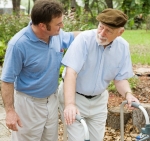This post is being published on Father’s Day and it gave me an opportunity to think about how the landscape for caregiving may be changing as men become more involved. According to updated statistics published by the Family Caregiver Alliance (caregiver.org), research suggests that the number of male caregivers may be increasing and will continue to do so due to a variety of social demographic factors.
A large majority of men have fallen into this role by default after losing their job in the recent economic downturn. Others have been providing care all along to their parents but are less likely to have been the primary caregiver.
Other studies have found that 36% of women caregivers handle the most difficult caregiving tasks (bathing, toileting and dressing) when compared with 24% for their male counterparts, who are more likely to help with finances, arrange care and other less burdensome tasks.
What I have found interesting from my own observation is that men care differently for their moms vs. their dads. Men are probably less comfortable with the personal care tasks with their moms as the statistics suggests and provide more emotional support instead. The men that I know who are actively involved as caregivers spend more one-on-one time with their mothers than their fathers. It may have everything to do with their overall relationship and family dynamics. I believe that they revert back to the little boy who was spoiled by their mothers, the same women whose breast they clung to for nutrition and first developed that bonding relationship with. The fathers’ relationship evolved a little different. Men socialize their sons to be less emotional, less nurturing and more independent and self-reliant. The relationship gets centered on sports, competitive environments and physicality.
Fast-forward 35+ years when that dad is elderly and needs care himself, that son is at a loss of how to navigate this scenario. This son who is an adult himself, is not able to recall that sense of nurturing toward his father. What ends up happening (and I suspect men think this is ok) is that the son will visit the father periodically, do only what is absolutely necessary (shave, haircut, doctor visit etc.…) try to compete for the most testosterone in the room and move on. A lot of grunting and beer probably complete the bonding ritual but that is about it.
Let me know if you have observed any differences in how men care for their moms vs. dads. Leave a comment below. If you liked this article, share it with a Dad for Father’s Day.
In honor of my Dad and Father-in-law, Happy Father’s Day in Heaven!

